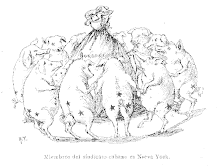After crafting a radical revision of the lead—turning what was before a series of clumsily-joined sentences and seemingly irrelevant facts into a cohesive argument-driven introduction—I was somewhat shocked to read a trite and testy condemnation of my work. “None of your goals were achieved in the edit,” it said; “it's wordy, unsourced [sic] opinion.”
Now, I’m well aware of the philosophy behind Wikipedia. Nobody owns an article; we are all supportive members of the collaborative process. Fine! Great! No problem! I’m not offended by criticism. Indeed, I rather welcome it. But I’m typically exposed to constructive criticism. This seemed like a tantrum in the form of a text message.
Undeterred, I responded to the criticism with a long, deliberate, subtly condescending (hence the pompous [sic]) defense of my work. I then proceeded to entirely redesign the historical background section. I changed the tone, injected some important details about how the event affected life beyond the English-speaking world, and corrected some foolish harping about the significance of this doctrine and that official.
 About a week later, as I was working on the next few sections of the article, I notice that someone had made some slight corrections to a single sentence within a major edit. This person, at least, had the courtesy to post an explanation of his corrections. But his concerns were trivial and his edits left the sentence awkward and broken.
About a week later, as I was working on the next few sections of the article, I notice that someone had made some slight corrections to a single sentence within a major edit. This person, at least, had the courtesy to post an explanation of his corrections. But his concerns were trivial and his edits left the sentence awkward and broken. So, to any and all of you out there. . . . Thanks for being there to keep articles free from things like “Sam was here” and “America Rocks.” But, please, back off a bit and let the people who invest real time and have real experience work.







No comments:
Post a Comment